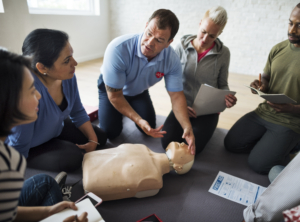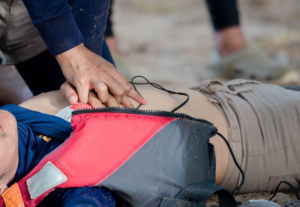Marine Basic First Aid: A Course Breakdown
Ensuring safety in marine environments is critical for those who work on or around water. The Marine Basic First Aid course offered by Alert First Aid equips participants with essential first aid and CPR skills tailored to marine settings. Here’s a detailed breakdown of the course and explains why it is a valuable investment for marine professionals.
Course Overview
The Marine Basic First Aid course is a comprehensive program specifically designed for individuals working in marine environments. This course meets the requirements of Transport Canada outlined in Transport Publication (TP) 13008 E and is recognized across the marine industry.
Training Formats
Blended Learning
- Online Instruction: Self-paced online modules that can be completed over 8 hours.
- In-Person Skills Session: Hands-on training led by experienced instructors, focusing on practical skills and realistic scenarios.
Fully In-Person
- Traditional classroom setting with comprehensive practical training.
Course Content
The course covers a wide range of topics essential for first aid in marine environments, including:
Emergency Response
Initial steps to assess the scene for safety, identifying hazards, and prioritizing actions to protect both the rescuer and the victim. Participants practice the “Check, Call, Care” approach to ensure a systematic and effective response.
Airway Emergencies and Management
Practical skills in managing airway emergencies, including techniques for clearing obstructions and ensuring proper ventilation. This module emphasizes the importance of quick action to prevent complications from airway blockages.
Breathing and Circulation Emergencies
In-depth training on CPR techniques for adults, children, and infants. Participants learn how to recognize respiratory and cardiac emergencies, perform effective chest compressions, and deliver rescue breaths. The use of Automated External Defibrillators (AEDs) is also covered.
First Aid for Respiratory and Cardiac Arrest
Advanced techniques for managing respiratory and cardiac arrest. Participants learn how to use AEDs effectively and understand the critical steps in providing continuous care until professional help arrives.
Wound Care
Assessment and treatment of various types of wounds, from minor cuts and abrasions to more severe lacerations. This module covers proper cleaning, dressing, and bandaging techniques to prevent infection and promote healing.
Head and Spine Injuries
Proper management of head and spine injuries to prevent further harm. Participants practice techniques for stabilizing the spine and safely moving victims with potential spinal injuries.
Bone, Muscle, and Joint Injuries
Skills in managing fractures, sprains, and dislocations. This module covers the use of splints and slings to immobilize injuries and reduce pain and swelling.
Sudden Medical Emergencies
Common medical emergencies such as seizures, diabetic emergencies, allergic reactions, and asthma attacks. Participants learn to recognize symptoms, provide appropriate first aid, and seek further medical assistance.
Environmental Emergencies
Handling environmental emergencies specific to marine settings, including hypothermia, heat exhaustion, and heat stroke. This module emphasizes prevention and response strategies to protect victims from extreme weather conditions.
Poisoning
Recognition and management of poisoning incidents, including ingestion, inhalation, and contact poisoning. Participants learn to provide first aid and contact poison control for further guidance.
Certification
Upon successful completion of the course, participants receive:
- Red Cross Certification in Marine Basic First Aid
- Transport Canada Certification
Both certifications are valid for three years. However, recertification requires completing the full course each time.
Who Should Take This Course?
The Marine Basic First Aid course is ideal for:
- Fishing Guides: Leading fishing expeditions in marine environments.
- Coast Guards: Personnel responsible for maritime safety and rescue operations.
- Commercial Fishers: Individuals working on fishing vessels.
- Marine Workers: Anyone engaged in marine or near-coastal activities.
Why Choose Alert First Aid?
At Alert First Aid, we are committed to providing high-quality training tailored to the needs of marine professionals. Our experienced instructors and comprehensive course materials ensure that participants receive the best education possible, equipping them with the confidence and skills to handle emergencies effectively.
Ready to get certified? Register for the Marine Basic First Aid course today and enhance your emergency response capabilities in marine environments.



